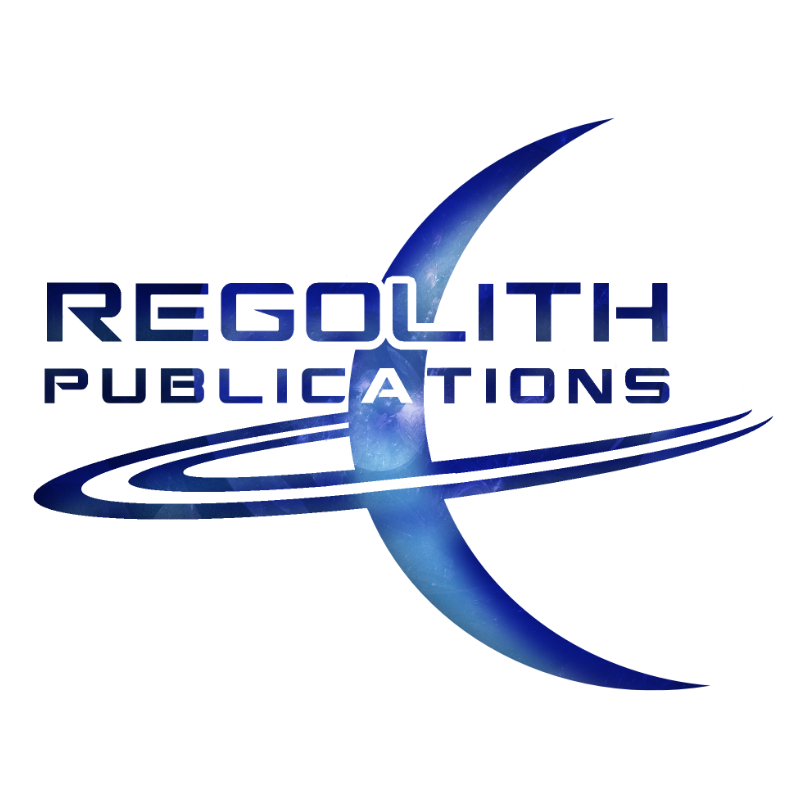|
STAR WARS : The Force Awakens (Spoiler-Free) Film Review PREFACE Before I get on with the review, I have to preface this with some personal trivia. I was only one years old when my parents took me into the theater to see Empire Strikes Back. One of my earliest childhood memories, the one seared onto my brain, is the fight scene between Darth Vader and Luke in the carbon chamber in Bespin, i.e. Cloud City. That microcosm of a dark, damp hell set within the confines of a heaven, was forever implanted into my young brain. I may not remember the name of my first kindergarten teacher or any of my playmates from when I was a small boy, but I remember Star Wars like it was a family member. When the VHS tapes came out, my family watched Star Wars, that is episodes 4, 5, and 6 at least once a month. By the time I entered high school we had worn the tapes out so severely that the sound had faded off the tape entirely and the picture would fade in and out at random. We replaced those tapes, and then between my own obsession with the series and my family's ritualistic watching of the series, we wore those tapes out too. Like many die-hard Star Wars fans, I have nearly every line of dialog memorized, every scene, in chronological order, stuck inside my brain. When I was a child, my brother and I were lucky to have a large collection of the Star Wars toys. I remember in high school how devastated I was when I accidentally knocked one of my favorite Star Wars glasses off the table and it shattered on the floor. I about cried. It was a special from Burger King back in the day, which had the movie posters printed on the drinking cups. I loved those cups. My affinity for Star Wars continued on into college when, dissatisfied the graphic design program at my university, I switched majors to become an English Literature student and enrolled into several mythology classes because I knew they were teaching Joseph Campbell, who was a professor of George Lucas, the creator of Star Wars. If Lucas was the student who became the master, then I wanted to learn from that same master teacher and dove right into the works of Joseph Campbell. So, Star Wars played a guiding factor not only in entertaining me and helping to form me in my formative years, but it also was a big factor in helping me decide what college major I chose and what path I took. Now I'm a writer, a novelist, and have had two commercials made based of short conceptual spec scripts I have written. And I'm just getting started. I still haven't yet achieved my own goal of writing a brilliant space opera, but there's still time. At any rate, I just wanted to preface this review by saying that -- like many who were influenced in deep and profound ways by the Star Wars films -- I too have an intimate relationship and deep appreciation for this part of cinema history, in a galaxy, far, far away. THE FORCE AWAKENS: Rebutting a Criticism
Alright, I know you're patiently waiting for my thoughts and opinions on the series, but before I get on with it I must do away with the most common criticism and complaint of the film I've seen so far. Here is a screen-cap I took from a conversation on Facebook that highlights the criticism that bothers me (mainly because it's a non-criticism, but more on that momentarily). It is surprising to me that this is even a complaint. As the second commenter observes, mythic archetypes and mythemes are the driving force (pardon the pun) behind the Star Wars mythos and story-telling. If this wasn't already abundantly clear by watching the films, which it totally is, George Lucas makes this explicitly clear in all of his commentary tracks (which only makes it that much more painfully obvious) on the DVDs and Bluray releases. As I stated in my initial response to this criticism, the recurring mythemes is a huge part of the Star Wars mythos, and to say they repeated it again here (with episode 7) but not the other films is simply a sign that you're not a genuine fan of the original films -- since you failed to notice the obvious, let alone fully appreciate it. I'd recommend these people (if they think of themselves as fans) go back an rewatch the Star Wars films again. That way they can see that A New Hope sets things up, Empire restates the mythemse and inverts others, but builds on them overall, only to continue this with Return of the Jedi, which borrows from both A New Hope and Empire. "Well, how many times are they going to tell the same story?" I hear. This is just sort of the same complaint re-worded. (I say complaint because it's not a criticism of anything wrong with the film or storytelling -- at least not one that is valid). The Force Awakens, is not the same story. It's a new, different story, that uses some of the same mythemes and archetypes that are present in the previous films and borrows from the previous films. I mean, yes, they hide a map inside a droid which reflects hiding the Death Star plans inside R2-D2 in A New Hope. Yes, there's a Star Killer mega Death Star they must battle which they do, just like they do in A New Hope and Return of the Jedi. Yes there's a desert planet and there's a young hero in search of her destiny. But having similar themes or even being self-referential, as all of the Star Wars films are, doesn't mean they are telling the exact same story. If these people would have read up on their Joseph Campell, they'd realize there are no new stories. Just stories waiting to be told in new ways. So this isn't even a valid critism for me. But it is a highly annoying complaint. Really, it's the equivalent of saying... "I'm a fan of Michael Bay films. I've watched all of his films. But I have to say, it seems his latest film had one too many explosions in it." Only to be pointed out... that's sort of the nature of Michael Bay films. Saying that Michael Bay films have one too many explosions sort of defeats the claim to being a Michael Bay fan in the first place. And the same goes for Star Wars and its use of recurring mythemes and interplay between mythical archetypes, which all the films use, borrow, and build on. To say The Force Awakens does this too much is exactly like saying Michael Bay films use too many explosions when that is the hallmark defining feature of those particular types of films. And I really don't feel sorry for people who don't get it and then wonder why the real fans rush to the film's defense and are quick to jump down their throats at such a complaint. The reason Star Wars fans get upset by it is that it's the very NATURE of Star Wars. If you don't get that, then I don't see how you can be a fan. To me, it sound a lot like a bunch of people are jumping on the episode 7 hate bandwagon to say how unimpressed they were, as if that were the hip and cool thing to do. Let's be counter-culture and fight the Star Wars commercialism running rampant! Well, fine. If that's your cause. But then don't pretend shocked when we call you out and say that you're no true Star Wars fan. You see, there are those of us who get it, who understand Star Wars for what it is, and we will not hesitate to call you nerf herding posers, and we'll likely tell all of you keyboard warrior hipsters who are trolling Star Wars fan-sites and blog posts to go get a life. Contrary to what the naysayers think, being anti-Star Wars does not make you cool in the same way being anti-Geek culture does not make you tolerant. So grow up. If it really wasn't your cup of tea then, fine, say that. But don't pretend to be a Star Wars fan and then say something as asinine as "It had too much Star Wars in that there Star Wars film." (Okay, reactor core meltdown over.) THE FORCE AWAKENS: SUMMARY In a galaxy, far, far away... We open with a massive shadow of a Star Destroyer flying over a planet. This is an inverse of the opening scene of the original Star Wars (yes, I will be calling it "A New Hope" as that was the title before 20th Fox stripped it off the film against George Lucas's approval -- which he later put back on for the 1981 theatrical re-release of the film -- of which my parents took me to when I was two years old). It is also a nod, some might say, to the similar shot done in Empire Strikes Back, which has a shadow of the Star Destroyer flying over the planet. And, I must say, I felt it was beautifully done. I think J.J. Abrams excels at paying homage to the franchise by taking what works and using it again, but doing it in a new way that puts an original twist on it, such as keeping the angles the same as the opening of A New Hope but inverting it with the negative of the shadow. Hey, if it ain't broke, don't try and fix it. It's a good rule of thumb, and this is probably one of the reasons The Force Awakens works so damn well. The fans wanted a Star Wars film that felt like Star Wars again (getting back to roots, so to speak) and, to his credit, Abrams did just that. He didn't try to mess with the mythos, rather, he merely had a blast (may or may not be a pun) playing around in the Star Wars sandbox. After the massive shadow passes a squadron of Storm Troopers get dropped onto a planet and literally storm the small encampment of settlers -- blasters firing. Apparently they are hunting down some rebels (in this film they are called the resistance, meanwhile the Empire has evolved into The First Order). Kylo Ren (played by Adam Driver) makes his presence known and is in search for a piece of a map that is vital to his mission -- of which he says is to finish what Vader started (as seen in the numerous trailers for this film). Without spoiling anything, the map acts as a McGuffin, just as the droids did in the first film by holding the plans for the Empire's battle station. That's what sets the ball rolling. I won't go into any further details, because it would be giving away too much, but you'll know exactly what I mean when you see the film for yourselves (if you haven't already). Having stormed the beach, the contingent of Storm Troopers end up slaughtering an entire village, and I must say this is the first film in the Star Wars franchise where I really felt that the Storm Troopers were menacing, dangerous, and lethal. Not the cheese-ball characters from Empire that couldn't hit a thing with their blasters but closer to the original version of them in A New Hope when they slaughtered Jawas and burned Luke's aunt and uncle alive and left their smoldering corpses on his doorstep for him to find when he returned home. One of the Storm Troopers seems to be having an emotional crisis in the midst of the massacre ordered by Kylo Ren, and instead of blindly following orders to slaughter innocent civilians, he puts his blaster down. Later we find out this morally conflicted character is Finn (played by John Boyega), one of our two main protagonists, who defects from the Storm Trooper ranks and flees The First Order. Meanwhile, in the aftermath of that, we cut to another story (or should I say fade-and-swipe?) A young girl, no more than twenty, is stranded on a desert world. Her whole life consists of scavenging for old parts from the left over debris of giant spaceships from a bygone era. The obvious wreckage of a great intergalactic battle that spanned to the farthest reaches of the galaxy. This is our hero Rey (played by the talented Daisy Ridley). In his escape from The First Order, Finn crashes onto the same desert planet that Rey is on. Surviving the wreck, Finn wonders the desert until he finds a small settlement and then bumps into Rey. Suddenly, Storm Troopers, in search of the McGuffin, rush down onto the settlement and discover our heroes. In a brilliant escape, our heroes get away, only to be thrust into an even bigger, more dangerous predicament. Obviously, this is a pattern common throughout all of the films. In A New Hope it was sneaking onto the Death Star, rescuing Princess Leia, only to get stuck in a trash compactor, only to get out but be stalked by the Dark Lord of the Sith himself, Darth Vader, only to lose Obi Wan Kenobi in an harrowing escape, and so on and so forth. And that's as much as I'm going to say about the basic plot here. WHAT I LIKED: I found the new cast of characters brilliant. They are all charismatic actors who can carry the franchise, I am in no doubt about this. Daisy Ripley and Jon Boyega are brilliant. I like the fact that there is a subtle tongue and cheek nod toward modern day politics here. I mean, I can't be the only one who noticed that it's a story about a woman and a black man running away from a crazed zealot in a hood hunting them around while clutching onto a burning crucifix. I really like Oscar Isaacs character Poe Dameron. I liked that he was a smart-ass and wasn't afraid to make wisecracks in front of Kylo Ren. I really enjoyed the new little droid running around BB-8. He's a very original design and he has at least as much personality as R2-D2. It really came off well in the film. I liked that Kylo Ren wasn't a one-dimensional villain. He was layered and complex and this will make his character a fun one to follow as the series progresses. Mostly though, I enjoyed seeing the old cast and seeing how they figured into this story and J.J. Abrams take on Star Wars. I really enjoyed the excellent balance between the old cast and new, and I liked that the old cast of characters never seemed to override the new cast of character's individual stories but fit nicely in with them. I liked the look of the film. It's aesthetically Star Wars. I liked seeing the Millennium Falcon, and I liked the reveal to it. I was pleased to find that this film continued with the humor in the same vein as episodes 4, 5, and 6. It was really well laced with humorous moments and scenes that didn't come off as campy or forced. Everything fell well into place. I loved that pace of this film. It's light years faster than the originals, especially the plodding and politically bogged down prequel trilogy (although I am still a huge fan of the opening scene in Episode 3 -- that star battle and the rescue of Senator Palpatine is epic -- and probably the best part of the prequels, in my honest opinion). WHAT I DISLIKED: Unlike some, I didn't find much of anything to dislike about this film as a film. As a stand alone space romp apart from Star War, it's thrilling. It's adventure filled. It stars a strong young female lead who shares most of her screen time with a black co-lead. Compared to the virtually all white cast of episodes 1, 2, 3, 4, 5, and 6 (minus Samuel L. Jackson and Billy D. Williams of course -- and James Earl Jones' voice) it really is as white as you could make a film. I loved the balance of race and gender here. At least, it's certainly a step in the right direction. And I'm loving the fact that the leads in the biggest movie of all time is a woman and a black man. So nothing to dislike really. Not story wise, anyway. But... and I say this with a sight of deep hesitation... but... I did have a problem with the very final scene of this film. Not in terms of what it was about but how it was shot. Let's just say it made me dizzy -- literally -- I was forced to grab onto the arm of my seat so I could push through the mild vertigo it invoked. I know not everyone will be affected by that scene in the same way, so really, it's just a personal gripe. WHAT BOTHERED ME: Aside from the light vertigo I experienced at the end... nothing much really. MY FINAL TWO CENTS: This is a great film. As a Star Wars film, it's wonderful. Like I stated above, it really feels like we've come back to the roots of what made this series great in the first place. I really loved all the characters. The story was fast and made sense. The action was fast and furious but never overdone. I like the more menacing Storm Troopers. I like how it uses many of the same elements as the first films, but changes them in interesting or novel ways that do this particular film's story justice. I like that the lightsaber battles weren't overdone like in episodes 2 and 3 but felt natural and realistic like in episodes 4, 5, and 6. I liked that the Force was spoken about but then they just decided to let it make its own presence known throughout the story. I practically liked everything about this film. It's really hard for me to rank this, because I love all of the Star Wars films for what they are. And in a way, they aren't complete without each other since they do share mythological archetypes and build on one another's mythemes while paying tribute to one another with winks and nods, and bleeps and bloops (in the case of droids). But whereas I can find some strong, really hard hitting criticisms for all of the Star Wars films, I find that this film's plotting is so tight that I can't find anything really to complain about. Which is probably why so many people seem to complaining so much about nothing. Oh, they hid the map in a droid! That's not novel! Well, it makes sense. Kylo Ren, like Vader before him, cannot read the mind of a droid. Droids are a safe place to hide your star charts and intergalactic porn. That's just basic common sense. By now, I'd expect it to be protocol. In the case of your capture by enemy forces, Genral Leia orders you to hider your plans in your droid. Don't question it, just do it. So, unless you're one of the purests born in 1977 who cannot stomach anything other than the original trilogy and who get bent out of shape of us 80s kids calling A New Hope by it's rightful title A New Hope, or a brainless halfwit who doesn't understand what makes Star Wars uniquely sucessful in how it builds on itself and re-uses mythemes and borrows liberally from previous installments as it builds up it's own mythos, then I'm sorry, but by all accounts, this is an excellent movie -- not to mention an excellent Star Wars film. Where you rate it among the series will be your prerogative, but I am breaking with precedent here and am placing it at the very top, in the number one spot. As much as I absolutely adore The Empire Strikes Back, I think that this film is slightly more fun (albeit just slightly) and a lot less depressing in terms of tone. And really, that's the deciding factor for me. At the same time, when I was six or seven, Return of the Jedi was my favorite. As a kid, I loved the Ewoks, the speeder bike chase, Jabba's palace, and Boba Fett! I still do. I actually think Jedi gets a bad rap. It's not as bad as so many critics seem to think. In fact, it's probably a better crafted film than both A New Hope and Empire, but at the same time it's not without its flaws either. And that's the thing. The Force Awakens seems to be one of those rare films that does so much right, in such an enticing way, that it's really hard to detect any real faults. I mean, I'm talking really big plot problems or technical issues that would knock it out of the running as a contender for top spot. And I think a lot of Star Wars fans are having this internal struggle. Some think that if they give into The Force Awakens, and replace their old favorite, say, Empire Strikes Back with it, they are somehow betraying a lifelong devotion to their favorite Star Wars by going over to the Dark Side. Others are more than happy to place this film solidly in second place behind Empire. Others are playing it close to the sleeve and are placing it at the end of the original trilogy. Which makes complete sense, because the story isn't complete. They could still drop the ball. But so far, regardless of where you rank it among the Star Wars canon, I think most everyone can agree that this is a stellar installment in the franchise. After all, even the nay-sayers who didn't like it because it was, apparently, had too much Star Wars in it -- whatever the hell that means -- are still placing it ahead of the prequel movies. So, well done to J.J. Abrams and everyone who worked on this movie. Personally, I can't find a lot wrong with it. Hardly anything at all. Sure, maybe I'll change my mind upon repeated viewings. Maybe it will be my favorite for a time, then like Jedi, it will fall out of favor and be replaced with one of the other films. I cannot rightly say at this time. But I'm not one to hold onto favorites simply for nostalgia's sake, so although I grew up with the original trilogy and admire parts of the prequels (hey, I'm not ashamed to admit that), I personally find Star Wars: The Force Awakens to be the best of the franchise. But that's just me. To each their own. I cannot recommend this film more. Go and see it if you haven't. And, as if it needed to be said, may the Force be with you.
0 Comments
Third time is a charm!
Nearly three years after having written this book, of re-writing this book, and then re-writing it again for a publishing company, along with buckets of sweat and tears, it is finally being released as the story I always intended it to be. I must give a heart-felt thanks for all those who worked hard in making my vision of a post-apocalyptic future with zombies a reality. This has been a dream come true. And now, with the 3rd edition of the book ready to go to print, be on the lookout for the paperback edition of BITTEN: RESURRECTION. The first batch of bookmarks and postcards have been printed (I opted to use OvernightPrints.com).
A few more are in the pipeline. Here's the latest postcard (3 of 4). Currently, I am waiting on my artist, who is a busy guy, to complete the last piece of commissioned art. It promises to be just as excellent as all the rest. Once I receive that I will make the final BITTEN postcards and send numbers 3 and 4 off to the printers. These collectible postcards and bookmarks should all be ready for the 11th annual Frightmare in Texas in April. I am also planning on having colored version of the artwork done up in limited posters / prints. To keep things affordable, I will limit the size of the prints to A3. This will make overall cost for printing, shipping, and sales more affordable for all. My plan is to offer the bookmarks free with every purchase of a paperback copy of a Winlock Press title. If a customer purchases $50 or over, they will get one free postcard. If one spends $100 they will get 2 collectible post cards. If they spend $150 or more on Winlock Press titles they will get the full set. Collectible postcards will only be given away with Winlock Press book purchases as they are an exclusive item intended only for serious fans and collectors. In addition to the bookmarks and postcards, the color posters / prints will cost $25 dollars individually or $20 dollars with any purchase of any given Winlock Press title. I'll keep everyone posted as things start to come together. In this new series, Movie Nostalgia: Vick's TOP picks, I will review my personal favorite films past and present.
For the first installment, I am going to talk about V for Vendetta, one of my absolute favorite superhero films based on a comic book / graphic novel of the same name by Alan Moore and David Lloyd. Summary: The story follows two characters set in a Dystopia of an Orwellian London in the not so distant future. First, we have the story of V (played by Hugo Weaving), a vigilante anti-hero in a Guy Fawkes mask, manifests at England's darkest hour, one unsuspecting November 5th, to start a revolution. Second, we have Evey (played by Natalie Portman), an unassuming factotum working in London's premiere media television station BTN (Britain Television Network). In the movie, we are never told Evey's position, but it's high enough to have security clearance and also be invited to the network's highest rated showrunner, her boss, Deitrich's (played by Stephen Fry) home for a private supper. The film opens with Evey on her way to Deitrich's for a fanciful evening. On the way to his house, she deliberately ignores the strict curfew of the State Controlled society, and gets cornered by three "Fingermen," or secret police of High Chancellor Adam Sutler (played by John Hurt), who corner Evey in a dark alley. As the Fingermen threaten to make Evey if not the sorriest ass in London then the sorest, a vaudevillian voice rings out down the dark alley and out steps a dark figure in a cloak and a Guy Fawkes mask, quoting Shakespeare's Macbeth. His name, which we discover momentarily, is simply V. His opening line is from Macbeth, Act I Scene 2, and V says: "The multiplying villainies of nature do swarm upon him... disdaining fortune/with his brandish'd steel, which smoked with bloody execution..." V saves Evey, and then introduces himself. He invites her to listen to his concerto and takes her up onto the roof of a nearby building. She begins to get worried when he whips out a conductor's wand and begins conducting the thin air. Thinking he's a crazy person she is about to flee when, low and behold, over the government speaker system comes a bit of classical music. V conducts the track with gusto and then, without warning, at the crescendo the instruments swell and with a boom, the Old Bailey across the street explodes and Lady Justice is brought tumbling down as V laughs and giggles with uncontrolled laughter. From here, we begin to learn more about both V and Evey. We learn what is driving V to enact his particular brand of vigilante terrorism, and we watch Evey transform from a terrified young woman living under the fearful domination of an authoritarian police state into an independent and fearless heroine willing to stand up to the powers that be, and who is no longer afraid of her own shadow. The story that unfolds is both epic and scope but also has a timeless quality, that speaks to you regardless of your age and where you were born. The characters are so well written that you'd have a hard time believing the source material, which was excellent to begin with, was a mere comic book (or rather, graphic novel for the aficionados). It's my opinion, however, the the story was much improved by the Wachowski sibling's most excellent script, who streamlined the narrative, pulled out the important characters, and did away with needless story tangents that bogged down the plot in the original graphic novel. I can honestly say, this is one of the rare cases where the film surpasses its source material in terms of quality and enjoyability. In fact, the Wachowski's improved upon the script in all the ways that matter. They made the themes in the graphic novel pertinent to a new generation of audience, and they made the characters more enduring. Evey is no longer the cliche downtrodden prostitute that she is in the comic book, she is now a vibrant young career woman making it on her own in a hard city during hard times. Further, V is no longer just a simple-minded anarchist, but rather, he uses anarchy as a means to his own ends in a sophisticated manner lacking in the comic book. Indeed, Alan Moore, who can be a bit pretentious and who seems to always want verbatim renditions of his graphic novels put onto the silver screen -- never mind that he doesn't seem to understand what an adaptation is or get the fact that the mediums are entirely different, or that stories as convoluted as his V for Vendetta only truly work when you trim the fat -- boycotted the film since it veered from his oh-so sacred source material. It fact, the very idea of it bothered him so much he demanded his name be omitted from the credits of the film. I suppose I cannot blame him too much. He did have to endure both the horrendous film renditions of his The League of Extraordinary Gentlemen and the abominable Johnny Depp vehicle To Hell, which were both stunning box-office flops. But I can blame him for underestimating the genius of the Wachowski's and the prime talent assembled under their careful watch as Executive Producers of the film. But apparently, after all the rave reviews, Alan Moore did see it, as he seems to offer commentary on it in numerous interviews, although he remained unimpressed. In the original graphic novel, V's cause was to instill anarchy, not freedom. Moore was critical of the movie for changing what he called the "anarchy vs. fascism" structure of his graphic novel into what he saw as an exploration of "American neo-liberalism vs. American neo-conservatism" and said that should have been set in the U.S. instead of Britain. But Moore should watch the film again more closely. V never claims to be fighting for freedom. Rather, like the comic, he is merely seeking revenge. In his vendetta against those fascists who enslaved England and who had created him in the process, and who had killed nearly a 100,000 innocent lives and covered it up, V uses anarchy as a tool to destabilize Sutler's government and turn everything on its head. He uses the people's desire for freedom to motivate them to his cause to disrupt the government via a state wide insurrection. By throwing everything into chaos, pitting the people against their government (something that gets highlighted when V mentions that "People shouldn't be afraid of their governments. Governments should be afraid of their people..."), V gets everyone distrusting everyone else, and is able to play their fears against them as he systematically proceeds to assassinate all those who were behind the atrocities inflicted. This, however, doesn't necessarily mean he wants complete, unchecked, freedom to replace the cold cruel fascism that he deliberately attempts to foil. In fact, besides his lust for vengeance, it doesn't appear V has any other motives (he falls in love with Evey, but even then he cannot change himself into anything other than he is -- not even for her). Rallying the people against Sutler's regime was simply a means to an end for V. Whether that ends in a Free Democracy replacing a tyrannical regime or something else entirely really doesn't seem to be a concern of V's. In fact, given his exchanges with Evey, it is pretty clear that V doesn't have any aspirations beyond seeking revenge and the total destruction of Sutler's criminal empire. Now, it is no surprise that Sutler, who took control of the country in its time of great weakness for dubious reasons, is made to resemble a real world Adolf Hitler, both in fascist political ideology and in look and tone. Even his speeches are given with the same Hitlerian inflection and fanatical intensity. But contrary to what Alan Moore might say, It's not at all clear to me that V is fighting for freedom, certainly not for democracy, since V isn't fighting for the people. He's fighting for himself -- for vengeance. He wants to rally the people to HIS cause. He's not there, like the Dark Knight, to fight for their cause -- he wants them to fight for him -- as a means to an end in his plot of vengeance, a vendetta, not in vain, but held as a votive (i.e., the fulfillment of a vow -- he even says as much in his initial introductory speech to Evey) . At one point he even admits to Evey that he is incapable of changing himself and thus must carry out his task to the very end, even if it means his death. When she asks him if he is going to kill more people, he says yes. For V, it is simply about destroying those that wronged him and harmed so many innocents, regardless of the consequences -- regardless of the rules -- and this is what makes him a true anarchist. WHAT I LIKED: Admittedly, I enjoyed nearly everything about this film. It really is a what we would call a sleeper hit. Nobody was expecting a comic book adaptation in 2005 that wasn't pushing a flagship title or series. Christopher Nolan's Batman Begins shattered records and kicked off one of the most successful comic book to movie reboots of all time. In this same year we saw two complete comic book to movie duds, the god awful Fantastic Four movie and the stylized and fun, yet beleaguered by stiff competition and poor word of mouth, Sin City directed by Frank Miller and Robert Rodriquez. While it seems Batman Begins was designed for mainstream audiences, Sin City was meant as a love letter to fans, and as for the Fantastic Four, this inadvertent comedic insult was probably just a bad mistake. Meanwhile, between the releases of these comic book film adaptations came the little known V for Vendetta, but like a magician pulling a rabbit out of his hat, it upset the box office and surprised critics and audiences alike who all gave V for Vendetta high praise and rave reviews. V for Vendetta currently holds onto an 8.2 rating on IMDB and an audience score of 90% on Rotten Tomatoes. Pretty good considering that Batman Begins, a much bigger film reaching an even wider audience, currently has a 8.3 IMDB rating and a 94% audience rating. This means that V for Vendetta, a virtually unknown comic book adaptation and avant garde political-science-fiction-thriller, is practically on par with what is considered to be one of the greatest comic book movie adaptations of all time, the Christopher Nolan Dark Knight films. But online metrics shouldn't determine whether or not the film is a success with you, just with the public in general. Like Nolan's Bat-verse, V for Vendetta strives for hyper-realism. It creates a believable world and moves as far away from comic book camp as possible. Whereas one might say Nolan's films move so far away from comic book camp that by the third film they come full circle again, V for Vendetta stays comfortably in that realistic world it constructs for itself. Another thing I absolutely loved was Hugo Weaving's performance as V. Needless to say, the entire film V stays behind the Guy Fawkes mask, yet his operatic over acting and his vaudevillesque voice all add to an extremely charismatic character expertly acted by Weaving. In fact, the very vaudevillian nature of V, and his constant quoting from film, literature, and even non-fiction, make for a fascinating character that seems almost too good to be true. In fact, throughout the whole film, up to the reveal of who V really is, you get the keen sense that we are dealing with someone that is more than just a mere mortal, we are dealing with Friedrich Nietzsche's Ubermensch. Besides his mysterious identity and his super-intelligence, V also has super-speed and super-strength. But rather than relying on his physical element, V utilizes his whit and his brains making him an extremely compelling cinematic figure. In fact, there are very few movie performances which leave me speechless and awestruck, but this is definitely one of them. And even though V wreaks havoc on the guilty, and murders people in cold blood, and creates chaos and mayhem while feeding the police clues which reveal the dark sins of the government, and even after he tortures his best friend, Evey, you still can't help but find him charming and be drawn to him. V is the epitome of the anti-hero, and it is to the Wachowski's credit that they understood the character better than the own character's creators. WHAT I DIDN'T LIKE: Honestly, I'd have to get extremely nitpicky to find much wrong with this film. It is a stunningly beautiful film. It has two unexpected love stories interwoven with a gripping distopian drama that is both frightening as it is engaging. It never really comments on the politics except only to say that wrong must be vanquished and that right must prevail, and it lets you decide if you agree with V or not in how he goes about doing that. The film writes Evey as V's polar opposite. While she is afraid, he is brave. While she is weak, he is strong. Eventually, he uses questionable tactics to make her into him. After she has a panic attack, he takes her to the roof, and she stands out in the rain. There is a timely scene flashback as V ruminates on his own creation out of fire, a stark contrast to Evey's new form, emerging anew in the cleansing rain. But even then, Evey informs V that she cannot stay with him. V's way is not Evey's way, and although they become equals in terms of their power -- they still remain opposites. For she keeps to the light of goodness while he will put one foot into the darkness so that he might use evil to fight evil, or, fire to fight fire as the symbolism would seem to suggest. Upon fulfilling a promise to return one year later on the eve of his revolution to share a dance, Evey kisses V, the ultimate form of forgiveness. Here we realize she has become stronger than V. She can change, but he cannot. She can forgive, but he cannot. Indeed, she is willing to accept him even after all he has done to her -- even after torturing her -- she still finds room in her heart to love the person beneath the mask. Later, upon trying to take his mask of to behold this visage of this ole vaudevillian veteran, V stops her, and tells her that although there is flesh and bone beneath, it is the idea that is more important. Later, it seems Evey internalizes this advice, when asked by Inspector Finch who he was she informs him that he was her deceased parents, her brother, herself, even Inspector Finch -- he was everyone. We assume this is because the ideals that V represented are universal and, in her own way, Evey has come to terms with the fact that the man behind the mask was the mask--or at least what that mask symbolized. At the same time, the film makes let the audience decide what ideals V embodied and allow the viewer to glean whatever they like from their own personal revelations. This works extremely well for a film like this, with its heavy distopian themes and counter-cultural ethos in which people simply go along with a Fascist regime because they are too fearful to do anything else. The film allows us to conclude what we want about V, and whether he was a hero, an anarchist, or a terrorist, if not all of these things, is left for us to decide. WHAT BOTHERED ME: If you haven't seen the film, this is going to be somewhat of a spoiler. But Adam Sutler seemed, in the end, to come off as a pansy ass and a coward. I can only guess that they were trying to emulate Hitler's kind of cowardice when, in his last moments, Hitler chose to commit suicide rather than face being put on trial for his crimes. If Hitler's evading justice wasn't cowardly enough, the filmmakers wrote Adam Sutler as a sniveling weakling shaking in his boots once he was stripped of his authority and was brought before V. Personally, I felt this simplified the character into a bad pastiche, a mere cliche of the super-villain. But on the other hand, it seems to work in the plot's favor. The almost comical level of quivering of Sutler seems to reflect V's own vaudeville spirit, and this leaves only Creedy, the true evil in this film, for V to contend with. In the end, Sutler was just a power mad fanatic, but the real power was in the hands of the scheming sociopath who was without conscience and who had an unending blood thirst -- since it was Creedy's own diabolic suggestion that the government use biological weapons on its own people to instill mass panic and fear so that Sutler could seize power and then, conveniently enough, turn around and provide the cure and secure the public's loyalty and trust (not to mention dependency) once and for all. Consequently, Creedy's plan to infect everyone and search for a naturally resistant donor just also happened to be the catalyst that lead to the creation of prisoner, code-named, V. And subsequently sealed Creedy's fate. One might even wonder if what seemed like V's plot to assassinate the High Chancellor may have just been a ploy to get his hands around Creedy's throat. In the end, however, the way Sutler was portrayed really doesn't matter so much since it becomes clear to us that he was just another pawn in V's scheme, another domino to be toppled in V's intricate plot for revenge. FINAL TWO CENTS: I HIGHLY recommend the film V for Vendetta for anyone interested in excellent characters, a dark distopian story with a great anti-hero, a brilliant cast of actors, and an excellent script. This movie succeeds on all levels, while offering a new take on some old themes, which is why it remains my all time favorite comic book movie and one of my top favorite films. |
Tristan VickBy day I am an educator and a cultural ambassador. By night I entertain notions of being a literary master. In reality I am just a family man and ordinary guy who works hard and loves writing just about as much as I love my family. Just about. AVAILABLE NOWNEWSLETTER
|
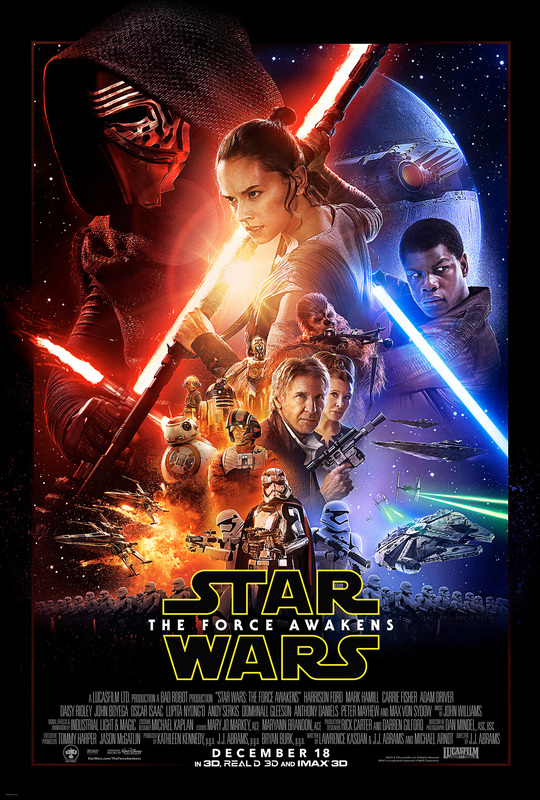
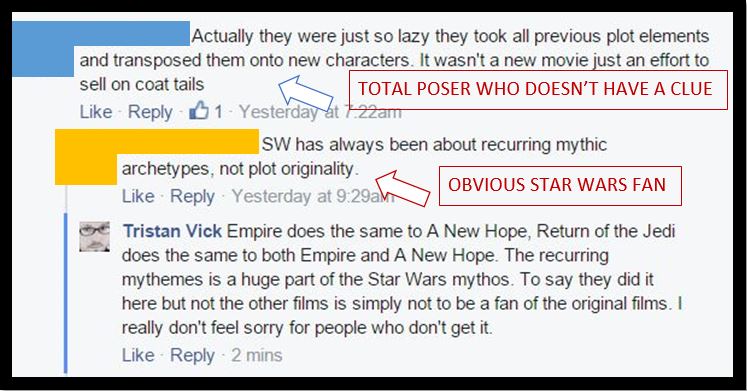
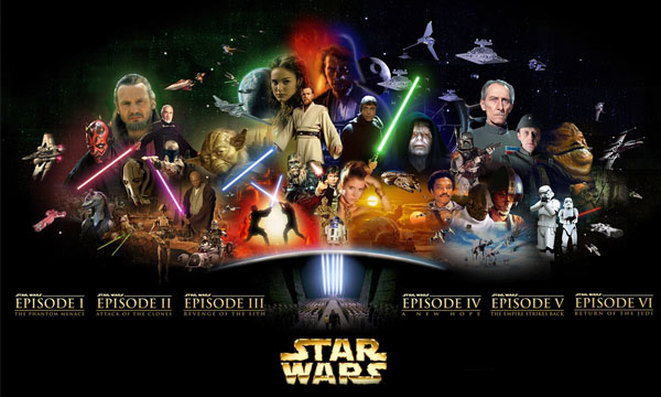
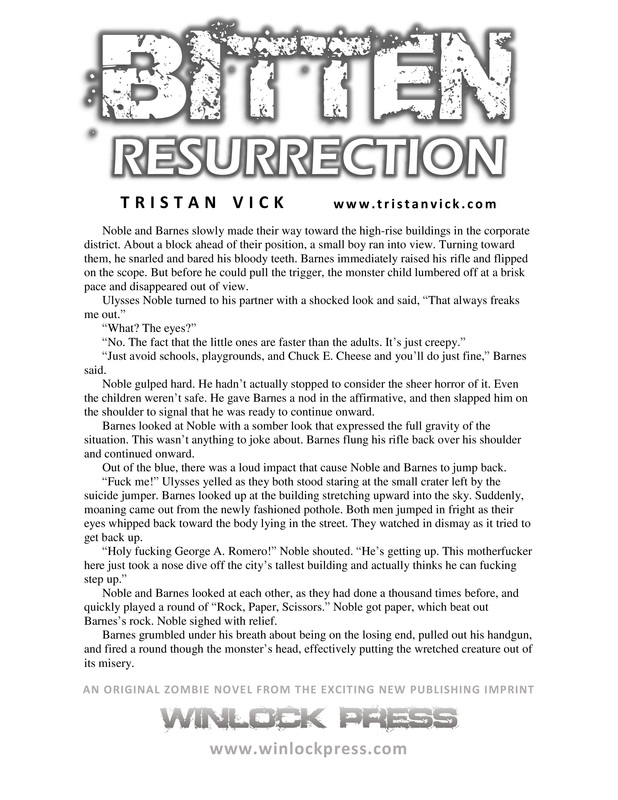
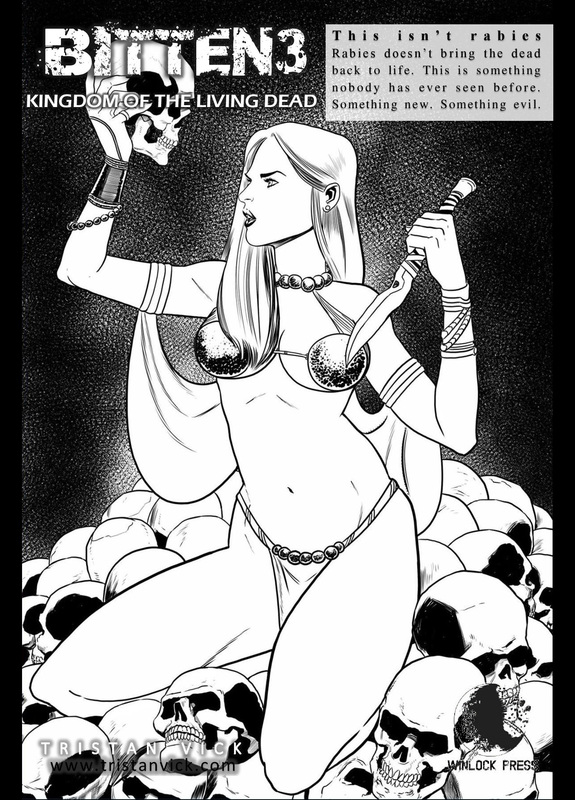
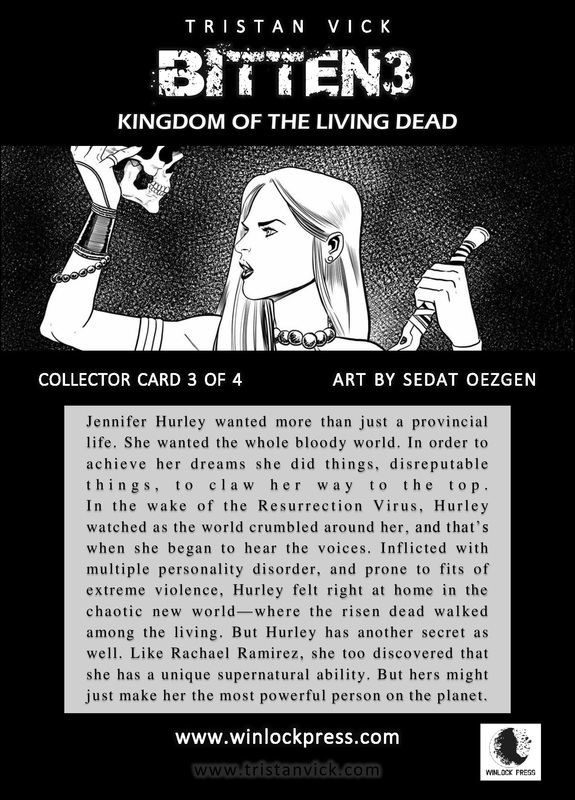
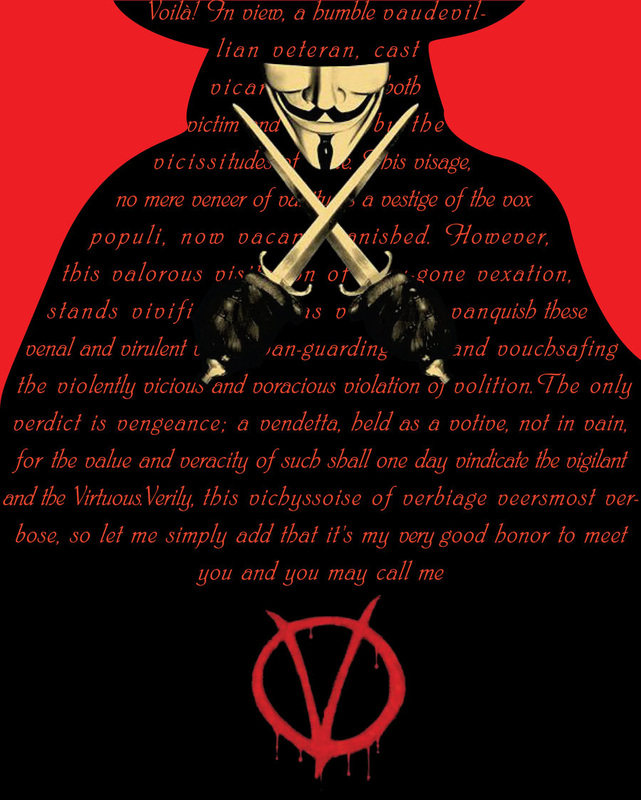
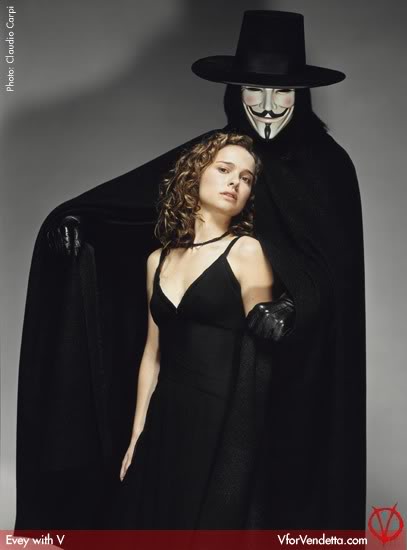
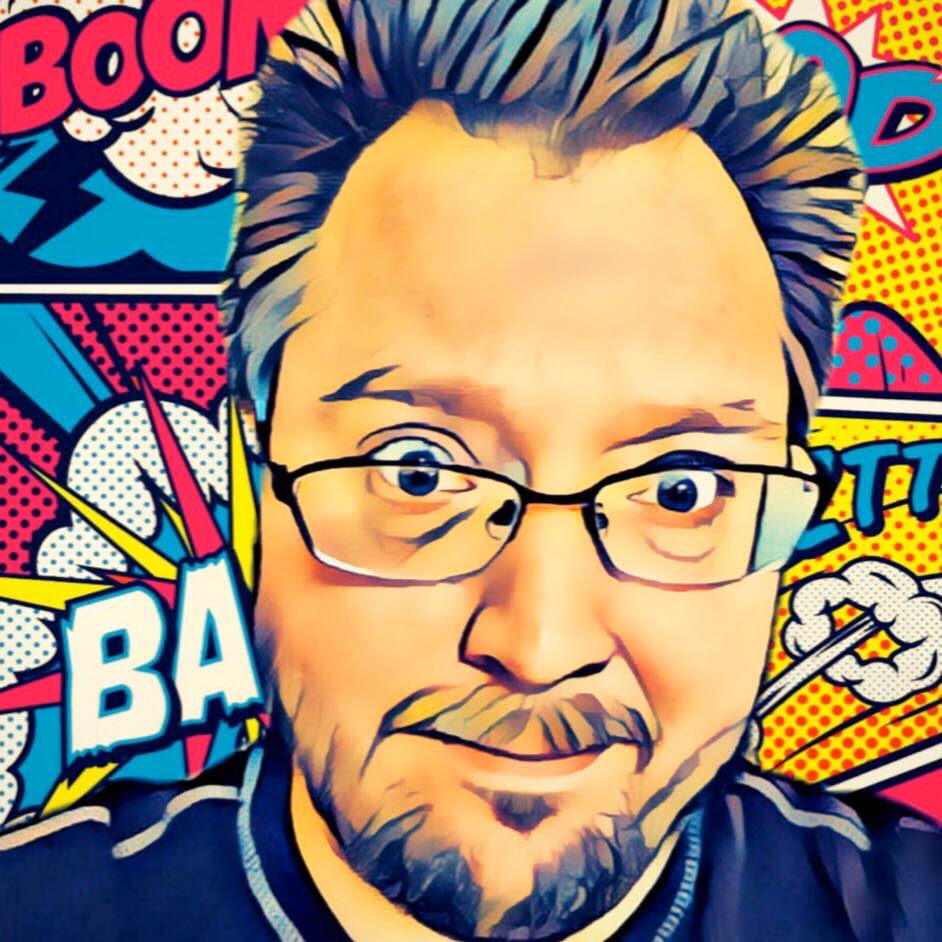
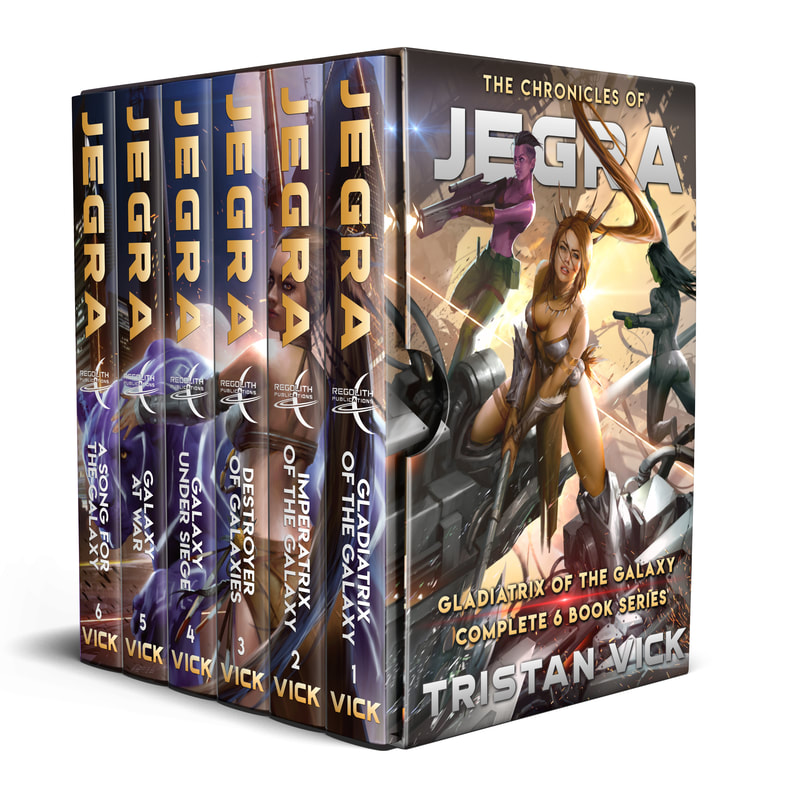
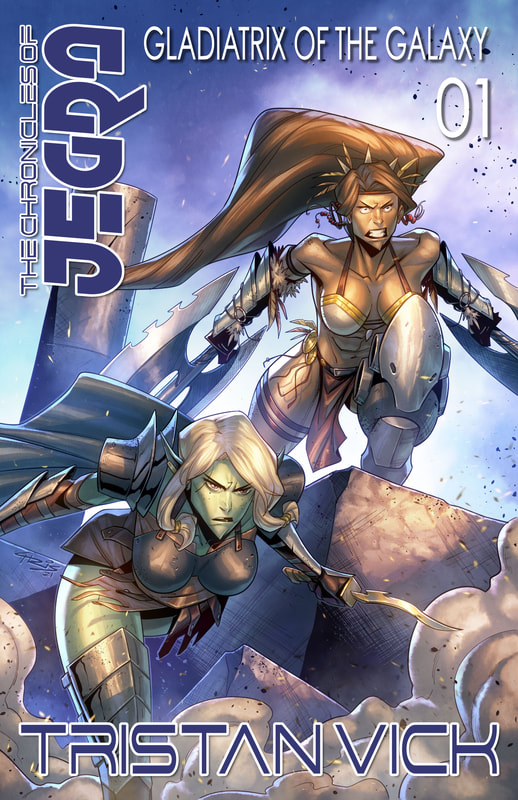
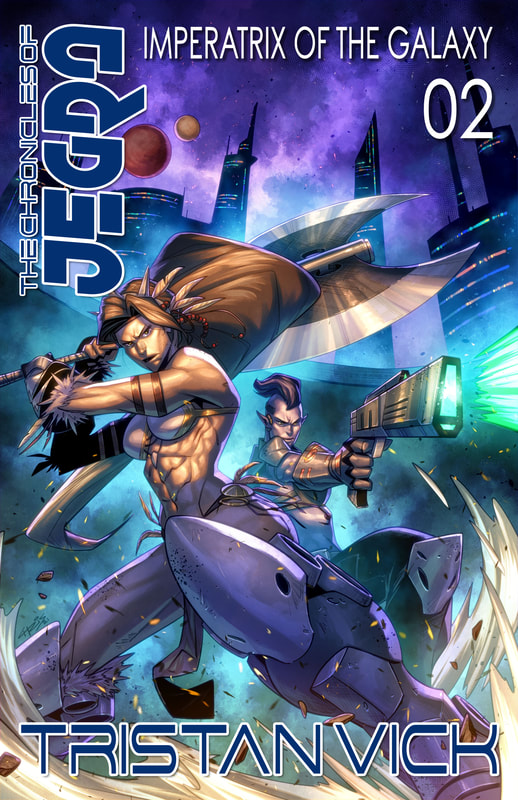
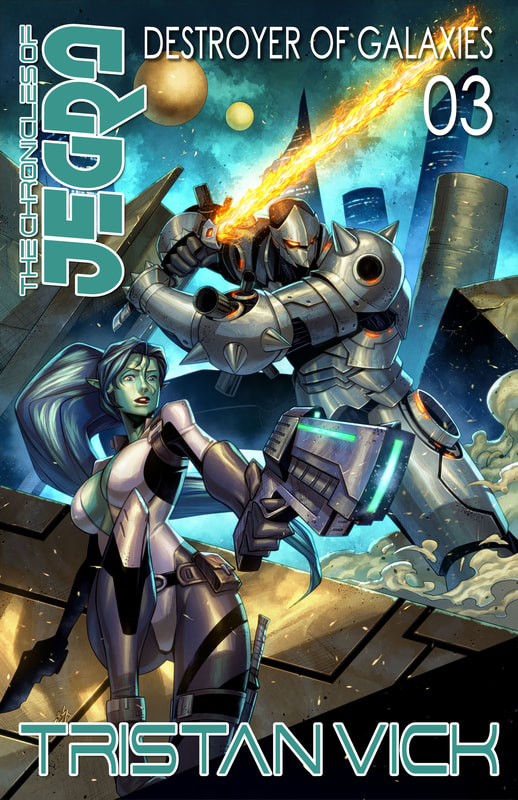
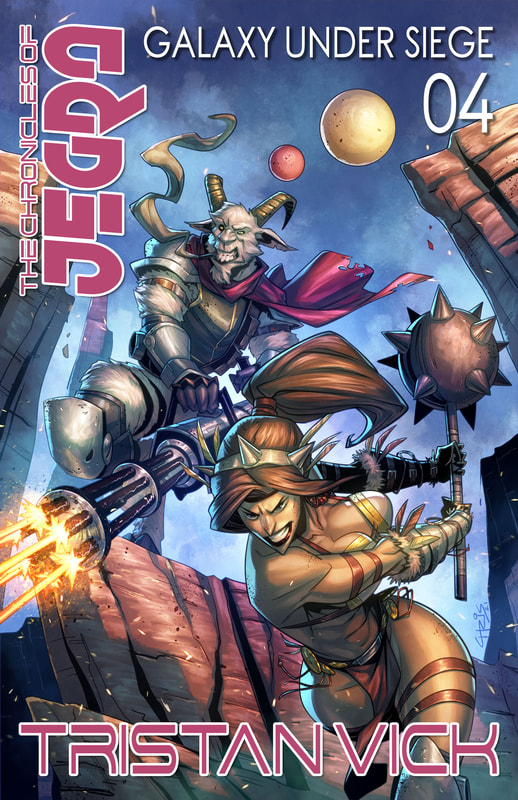
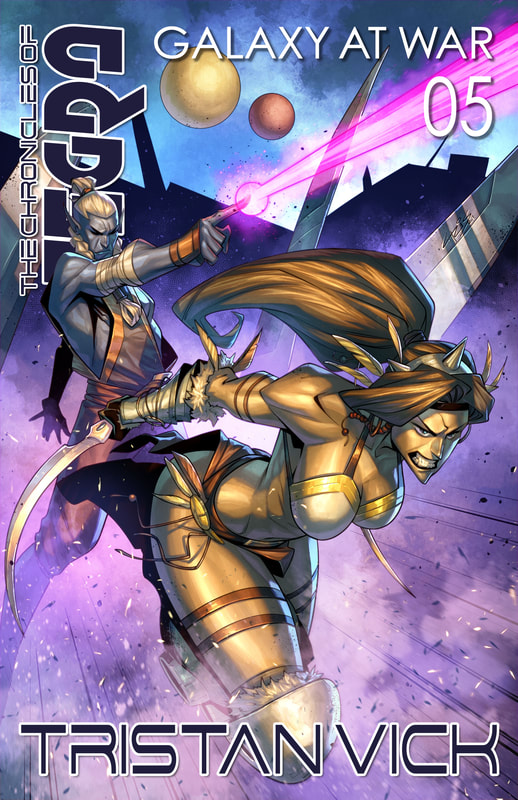
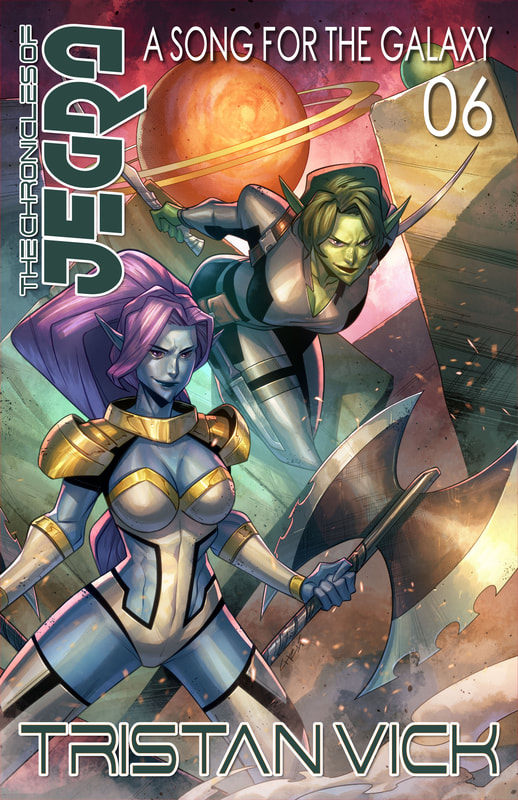
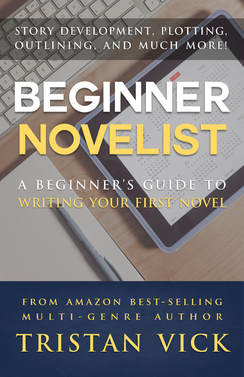
 RSS Feed
RSS Feed
